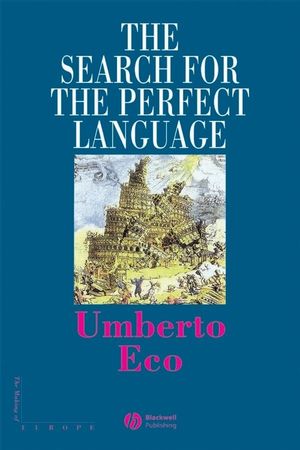The Search for the Perfect LanguageISBN: 978-0-631-20510-4
Paperback
400 pages
April 1997, Wiley-Blackwell
 This is a Print-on-Demand title. It will be printed specifically to fill your order. Please allow an additional 10-15 days delivery time. The book is not returnable.
|
||||||
Introduction.
1. From Adam to Confusio Linguarum. .
Genesis 2, 10, 11.
Before and After Europe.
Side-effects.
A Semiotic Model for Natural Language.
2. The Kabbalistic Pansemioticism. .
The Reading of the Torah.
Cosmic Permutability and the Kabbala of Names.
The Mother Tongue.
3. The Perfect Language of Dante.
Latin and the Vernacular.
Language and Lingusitic Behavior.
The First Gift to Adam.
Dante and Universal Grammar.
The Illustrious Vernacular.
Dante and Abulafia.
4. The Ars Magna of Raymond Lull. .
The Elements of the Ars Combinatoria. .
The Alphabet and the Four Figures.
The Arbor Scientarium.
The Concordia Universalis of Nicholas of Cusa.
5. The Monogenetic Hypothesis and the Mother Tongues. .
The Return to Hebrew.
Postel's Universalistic Utopia.
The Etymological Furor.
Conventionalism, Epicureanism and Polygenesis.
The Pre-Hebraic Language.
The Nationalistic Hypotheses.
Philosophers against Monogeneticism.
A Dream that refused to Die.
New Prospects for the Monogenetic Hypothesis.
6. Kabbalism and Lullism in Modern Culture.
Magic Names and Kabbalistic Hebrew.
Kabbalism and Lullism in the Steganographies.
Lullian Kabbalism.
Bruno: Ars Combinatoria and Infinite Worlds.
Infinite Songs and Locutions.
7. The Perfect Language of Images.
Horapollo's Hieroglyphica.
The Egyptian Alphabet.
Kircher's Egyptology.
Kircher's Chinese.
The Kircherian Ideology.
Later Critics.
The Egyptian vs. the Chinese Way.
Images for Aliens.
8. Magic Language.
Hypotheses.
Dee's Magic Language.
Perfection and Secrecy.
9. Polygraphies.
Kircher's Polygraphy.
Beck and Becher.
First Attempts at a Content Organizations.
10. A Priori Philosophical Languages. .
Bacon.
Comenius.
Descarted and Mersenne.
The English Debate on Character and Traits.
Primitives and Organization Content.
11. George Dalgarno.
12. John Wilkins. .
The Tables and the Grammar.
The Real Characters.
The Dictionary: Synonyms, Periphrases, Metaphors.
An Open Classification?.
The Limits of Classification.
The Hypertext of Wilkins.
13. Francis Lodwick. .
14. From Liebniz to the Encyclopédie.
Characteristica and Calculus.
The Problem of the Primitives.
The Encyclopedia and the Aphabet of Thought.
Blind Thought.
The I Ching and the Binary Calculus.
Side-effects.
The 'Library' of Liebnitz and the Encyclopédie.
15. Philosophic Language from the Enlightenment to Today. .
Eighteenth-century Projects.
The Last Flowering of Philosophic Languages.
Space Languages.
Artificial Intelligence.
Some Ghosts of the Perfect Language.
16. The Internatonal Auxiliary Languages.
The Mixed Systems.
The Babel of A Posteriori Languages.
Esperanto.
An Optimized Grammar.
Theoretical Objections and Counter-objections.
The 'Political' Possibilitites of an IAL.
Limits and Effability of an IAL.
Conclusion.
Translation.
The Gift to Adam.
Notes.
Bibliography.
Index.



